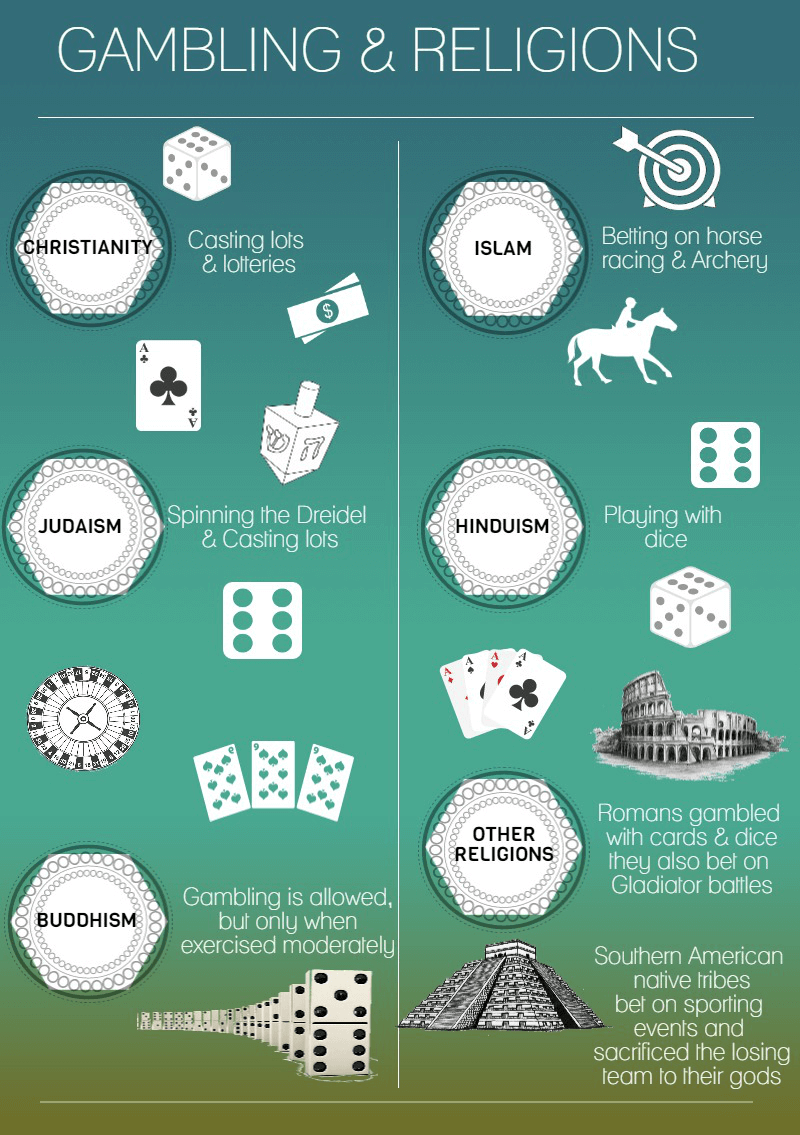Gambling is recognized as one of the oldest of all forms of entertainment, and researchers have found evidence of luck- and fate-oriented rituals and rites in amongst the ruins of temples and in the oldest religious books and texts. In addition, with the importance of gambling in popular and traditional cultures, it’s not surprising that various religious texts both mention gambling and take a stand on it.
While we’re not theological experts, we do find it interesting to see how different religions approach the subject of gambling and betting. This article is not intended to cause any offence, but rather, to look at how different systems of belief interpret and comment on our shared pastime.
While we’re not going to get into a debate on whether or not gambling is moral (and, let’s face it, if you’re reading this, you probably don’t think gambling is a problem so long as you play responsibly), it is intriguing to see how different religions approach the question of gambling. So, without further ado, here goes: where do religion and gambling meet?
Gambling and Christianity
The phrase “to cast your lot” means to share in something or join a group regardless of the outcome. It comes from the biblical practice of casting lots, or rolling dice, to make decisions without bias.
In fact, the future of entire tribes was sometimes determined by throwing dice: according to the book of Exodus, Joshua (Moses’s successor, the man who took the Israelites into the Promised Land of Israel) determined where the 12 tribes would settle by casting lots.
In addition to that, when Jesus was being crucified, the gospel writers say that the Roman soldiers at the bottom of the cross “cast lots” to work out who would get his clothes. Not quite an endorsement of gambling, but it’s definitely mentioned in the Bible on several occasions.
Finally, Judas Iscariot’s replacement, St Matthias, was actually chosen by casting lots. Although there’s no official patron saint of gamblers as such, we feel that St Matthias should fulfil this role (St Jude, the patron saint of lost causes, doesn’t fit the bill, as gambling isn’t necessarily a lost cause. Why would we do it, otherwise?).
On top of that, those of you who attend or have attended church will know about the typical church raffle, where parishioners are asked to buy tickets to help fund the new church roof, or the tombola at the church fete, where you can win fabulous prizes including a hamper of new gardening equipment and some fine homemade jams…
We think we’ll go with the online version, if it’s all the same to you.
But on a more philosophical note, one Christian thinker is renowned for his theological gamble. Blaise Pascal’s metaphysical justification for religious belief has come to be known as Pascal’s Wager. It goes something like this: if you believe in God and there is a God, you win. If you don’t believe, and there is a God, you lose. However, if you believe in God and there is no God, you don’t lose, even if you don’t win. So the best possible option is to believe in God, guaranteeing you’ll “win” either way.
It’s not a very good gamble, and of course, ignores the whole point of faith, which is that it shouldn’t be subjected to reason. Plus, “believing” based on this argument makes it all seem a bit… pointless, really.
Gambling and Islam
Gambling is usually dealt with in the same way as alcohol in Islam; that is, both are haram or forbidden. However, the Quran does seem to permit gambling in certain instances, mostly when it’s a sure thing. The main point is not to waste money, and to appreciate the work involved in acquiring wealth.
The Prophet Muhammad was recorded as saying, in the Sunan Abu Dawud, that “Wagers are allowed only for racing camels or horses, or shooting arrows.” This should also be prefaced by saying that, as pointed out above, Islam generally looks down on gambling, and exceptions were included more in order to encourage early Muslims to be ready to defend themselves than for the encouragement of actual wagering.
Unsurprisingly, though, the Oriental themes you see in games like Arabian Nights, The Wish Master, and other Thousand and One Nights-themed games and casinos, complete with genies, magic lamps, and three wishes, are not really in line with mainstream Islam. It’s interesting to note that genie is a translation of djinn, a spirit that, although possessing free will, was nevertheless connected with demons and evil. In fact, the Islamic devil (Shaytan, or Satan) was a djinn who rebelled against Allah.
As a result, gambling is typically outlawed in Muslim countries, with penalties ranging from fines to severe beatings and imprisonment. However, in some of the more liberal Muslim countries in the Arabian Gulf and elsewhere, non-believers and tourists are allowed to gamble, although typically under very strict supervision. No Muslims are allowed to gamble in these areas, though.
Gambling and Judaism
Judaic texts are fairly silent on the practice of gambling. That said, playing for money has traditionally been looked down upon by the authorities. In fact, professional gamblers were not considered to be reliable witnesses in a court of law, because they did not create anything of worth.
However, it’s still not the whole truth, as, just like in the Bible, the Torah also mentions the casting of lots, such as in the story of Jonah and the Whale. The Hanukah holiday celebrations in December are usually accompanied by a dreidel, a spinning top that lets you play for small amounts of cash in a family setting. And in fact, some synagogues encourage laughter, celebration, and a degree of gambling at Purim, a Jewish religious celebration that commemorates Esther’s saving the Jews in Persia.
There’s also a commonly held belief that, just as long as it’s for a good cause, lotteries and raffles are also permissible in Jewish life. Like in Christianity, funds have to be raised somehow, and asking your congregants to cough up for a ticket that’ll go towards helping the community can hardly be considered to be evil. As ever, moderation in all things, including moderation!
One noted thinker, Rabbi Louis Jacobs, who was a leader of Conservative Judaism in the UK for many years, even notes that a mild flutter, “and even a not so mild one,” is perfectly fine. Playing cards, betting on horses, and taking part in games of pure chance are not that problematic in Judaism, then, just as long as you’re careful.
Judaism, even the Orthodox variety, has typically exhibited a tolerance that is not often seen in some of the more extreme versions of the other Abrahamic religions. Would that this tolerance carried over into all systems of belief…
Gambling and Hinduism
Hinduism is another religion that tends to look down on gambling, but interestingly enough, a dice game forms a substantial part of one of the major texts in the Hindu belief system.
The Mahabharata, a Sanskrit epic believed to have been written around the 8th or 9th centuries BCE, is the longest known epic poem and, according to Wikipedia, consists of over 200,000 individual verse lines, arranged in 100,000 shloka or couplets. It is divided up into 18 books, and one of the most famous parts, the dice game, takes place in the second book, the Sabha Parva, or the Book of the Assembly Hall.
In this part of the story, the king, Yudhisthira, is tempted into playing a game of dice, as this is the only way to conquer the kingdom. He is tricked into giving away his entire kingdom, forcing his family into exile for 12 years. This story is arguably about being wary around untrustworthy individuals, which is a fairly good piece of advice to take!
You can work out which casinos you should be wary of (or which you can play at without any worries) by having a look at our casino reviews.
Gambling and Buddhism
Finally, let’s have a look at one of the world’s oldest major religions. While there are all sorts of stereotypes surrounding Buddhism, its adaptability and flexibility means that it takes a remarkably relaxed approach to gambling.
As ever, extreme betting is not condoned, and players are encouraged to use caution when making wagers or bets. However, that’s about the extent of the concern from Buddhist philosophy.
Buddhism distinguishes between 3 different types of gambling: recreational, habitual, and addictive. Needless to say, addictive gambling isn’t allowed, but the other 2 are fine, just as long as they don’t cross the line into problematic gambling. Indeed, the Buddhist Precepts say that recreational gambling is perfectly OK, while, although not entirely condoned, habitual gambling is still permissible, albeit with the proviso that players keep an eye on their gambling.
Buying lottery tickets and running raffles, however, should not be used to raise funds for Buddhist organizations. Which is a pity, because, as the Christian approach has shown, it can be quite a good way of getting money for major social projects and other religious endeavors.
And Other Religions?
We’ve taken a look at the 5 major world religions and their approach to gambling. However, there are many other religions out there, each with their own approach to gambling. Ancient religions had particularly interesting approaches to games, gambling, and chance.
In ancient Greece, Hermes, the messenger of the gods, was also the god of luck and the patron of gamblers. The Romans were known to be hardcore gamblers, betting on everything from gladiatorial fights to card games. The Roman goddess of luck was Fortuna, who went around blindfolded and whose symbol was the wheel of fortune. Guess where we get our wheel of fortune from!
Finally, in the Central and South American cultures of the Mayans and the Aztecs also placed a lot of importance on gambling, giving it a ritualistic significance not seen elsewhere. The Aztecs worshipped Macuilxochitl, the god of feasting, dancing, music and gambling. If you cheated at a game, you’d be subjected to his wrath. The Mayans, on the other hand, bet on a sacred game that resembled football or basketball. It was slightly different to modern-day games, though, as the losing team would be sacrificed. But then again, perhaps the English football team would have preferred that to the tongue-lashing they got when they returned home from Brazil…
While ancient religions were more blasé about gambling, the common thread amongst modern religions does seem to be that, while gambling itself is not necessarily a problem, it’s when it gets out of hand that it starts causing trouble.
So if you’d like to gamble safely, have a look at our list of online casino reviews, and if needed, impose limits on yourself to ensure that a harmless pastime doesn’t become a dangerous habit.





























